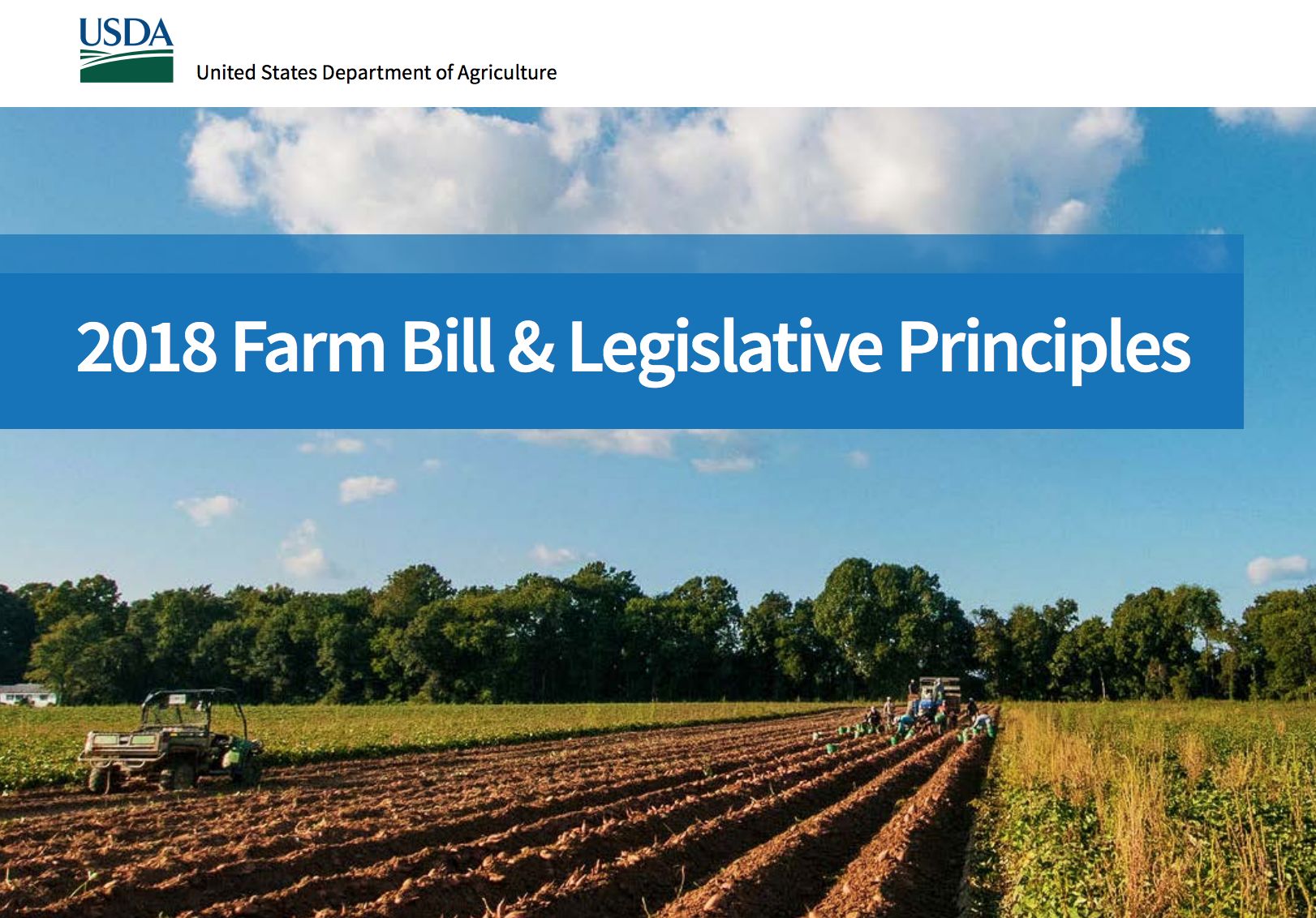Perdue announces USDA’s Farm Bill and Legislative Principles

Secretary of Agriculture Sonny Perdue recently announced the U.S. Department of Agriculture’s Farm Bill and Legislative Principles for 2018 during a town hall at Reinford Farms in Mifflintown, Pennsylvania.
“Since my first day as the secretary of agriculture, I’ve traveled to 30 states, listening to the people of American agriculture about what is working and what is not. The conversations we had and the people we came across helped us craft USDA’s farm bill and legislative principles for 2018,” Perdue said.
“These principles will be used as a road map—they are our way of letting Congress know what we’ve heard from the hard-working men and women of American agriculture. While we understand it’s the legislature’s job to write the farm bill, USDA will be right there providing whatever counsel Congress may request or require.”
A few highlights of the four-page memorandum:
Farm production and conservation
Promote a variety of innovative crop insurance products and changes, enabling farmers to make sound production decisions and to manage operational risk.
Ensure that voluntary conservation programs balance farm productivity with conservation benefits so the most fertile and productive lands remain in production while land retired for conservation purposes favors more environmentally sensitive acres.
Support conservation programs that ensure cost-effective financial assistance for improved soil health, water and air quality and other natural resource benefits.
Trade and foreign affairs
Improve U.S. market competitiveness by expanding investments, strengthening accountability of export promotion programs and incentivizing stronger financial partnerships.
Open foreign markets by increasing USDA expertise in scientific and technical areas to more effectively monitor foreign practices that impede U.S. agricultural exports and engage with foreign partners to address them.
Food, nutrition and consumer services
Support work as the pathway to self-sufficiency, well-being and economic mobility for individuals and families receiving supplemental nutrition assistance.
Strengthen the integrity and efficiency of food and nutrition programs to better serve our participants and protect American taxpayers by reducing waste, fraud and abuse through shared data, innovation and technology modernization.
Encourage state and local innovations in training, case management and program design that promote self-sufficiency and achieve long-term, stability in employment.
Marketing and regulatory programs
Enhance our partnerships and the scientific tools necessary to prevent, mitigate and where appropriate, eradicate harmful plant and animal pests and diseases impacting agriculture.
Protect the integrity of the USDA organic certified seal and deliver efficient, effective oversight of organic production practices to ensure organic products meet consistent standards for all producers, domestic and foreign.
Food safety and inspection services
Support and enhance FSIS programs to ensure efficient regulation and the safety of meat, poultry and processed egg products, including improved coordination and clarity on execution of food safety responsibilities.
Continue to focus USDA resources on products and processes that pose the greatest public health risk.
Research, education and economics
Develop an impact evaluation approach, including the use of industry panels, to align research priorities to invest in high priority innovation, technology and education networks.
Empower public-private partnerships to leverage federal dollars, increase capacity, and investments in infrastructure for modern food and agricultural science.
Prioritize investments in education, training and the development of human capital to ensure a workforce capable of meeting the growing demands of food and agriculture science.
Rural development
Expand and enhance the effectiveness of tools available to further connect rural American communities, homes, farms, businesses, first responders, educational facilities and healthcare facilities to reliable and affordable high-speed internet services.
Partner with states and local communities to invest in infrastructure to support rural prosperity, innovation and entrepreneurial activity.
Natural resources and environment
Expand Good Neighbor Authority and increase coordination with states to promote job creation and improve forest health through shared stewardship and stakeholder input.
Reduce litigation risk and regulatory impediments to timely environmental review, sound harvesting, fire management and habitat protection to improve forest health while providing jobs and prosperity to rural communities.
Offer the tools and resources that incentivize private stewardship and retention of forestland.
Management
Modernize internal and external IT solutions to support the delivery of efficient, effective service to USDA customers.
Provide USDA full authority to responsibly manage properties and facilities under its jurisdiction.
Recognize the unique labor needs of agriculture and leverage USDA’s expertise to allow the department to play an integral role in developing workforce policy to ensure farmers have access to a legal and stable workforce.
Leaders of two agricultural organizations emphasized that Congress must write a farm bill to help agricultural producers.
American Farm Bureau Federation President Zippy Duvall said, “The secretary’s farm bill principles look to the future while securing the present for farmers and ranchers who continue to face a prolonged period of reduced farm income. We are pleased the secretary and his team have highlighted not just the importance of risk management on the farm, but also rural development, research and development, trade, conservation and nutrition.
“We applaud Secretary Perdue’s clear signal that he is looking forward to working with agriculture’s leaders in Congress, just as is Farm Bureau, to arrive at a farm bill that will bring out the best agriculture has to offer the American people and the world.”
National Farmers Union President Roger Johnson said in a statement, “The farm bill, rightly so, touches all aspects of our food system. As such, Congress must write and pass a farm bill this year that adequately supports each part of the food system—from the family farmers who grow our food, to the land they do it on, to the rural communities they support, and all the way to the consumers who rely on safe, affordable food.
“Providing adequate support begins with a recognition of the dire economic conditions of the farm economy, the impacts of food production on the land, and the moral imperative of our country to ensure its most vulnerable citizens have access to food.”
Larry Dreiling can be reached at 785-628-1117 or [email protected].

